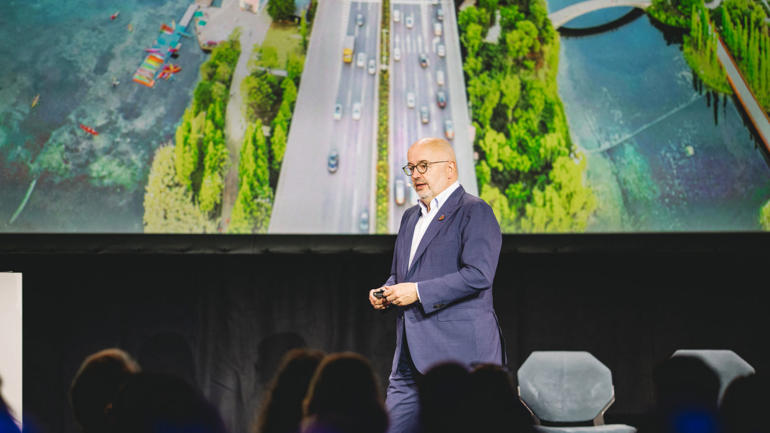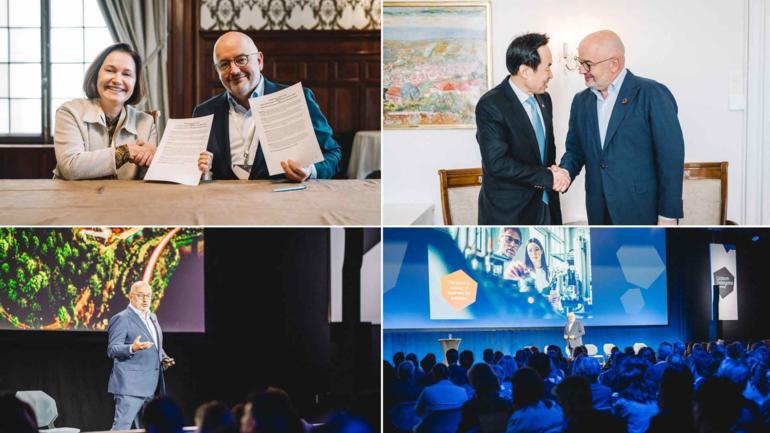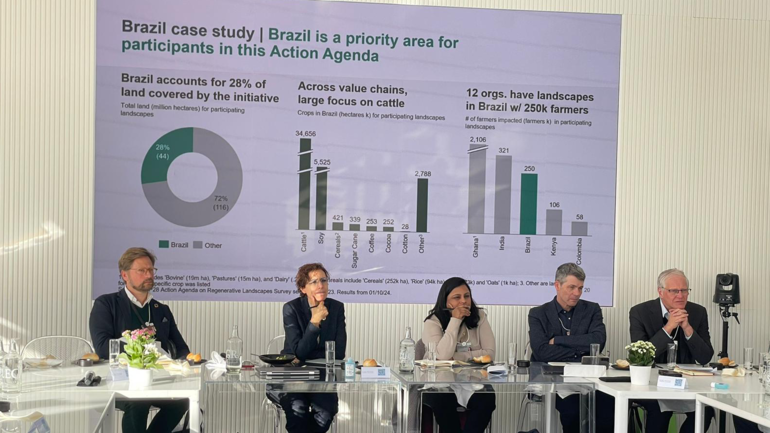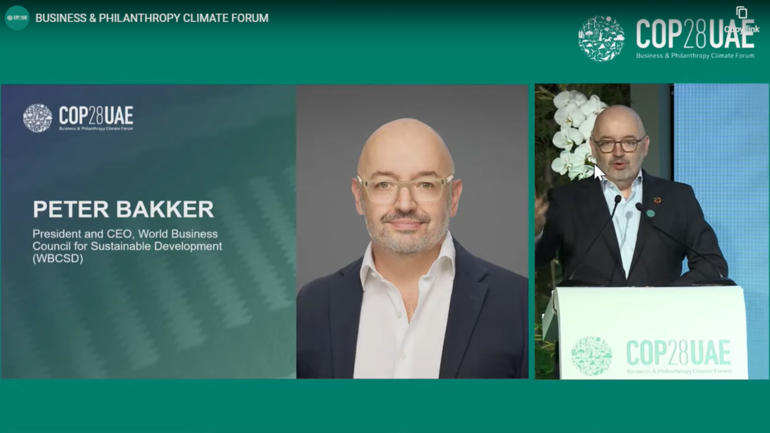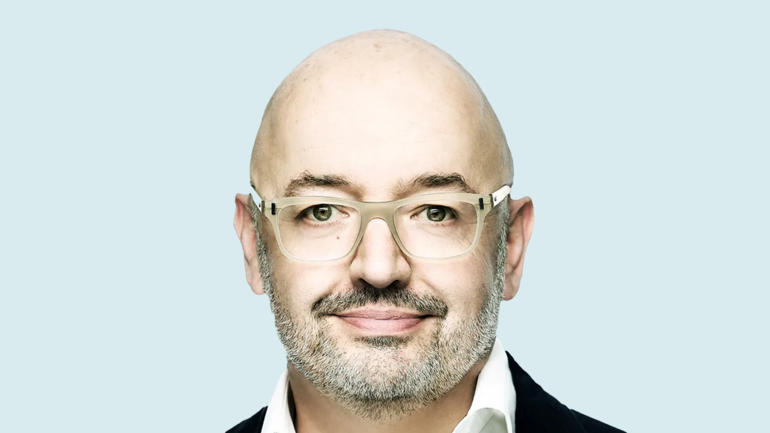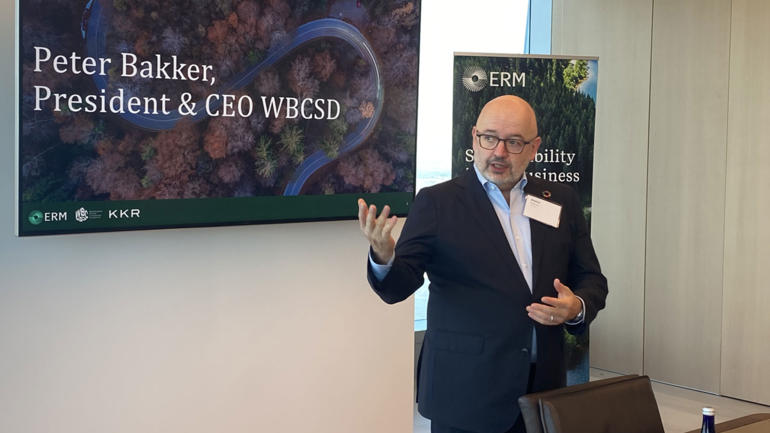Born in the Netherlands in 1961, Peter Bakker joined the World Business Council for Sustainable Development (WBCSD) in 2012 as President and CEO. The WBCSD was started in 1995 as a platform for companies to respond to sustainability challenges that more and more companies were becoming aware of at that time. Nearly 200 of the world’s most progressive companies are now working together to accelerate the transition to a more sustainable world.
The vision is to build a world in which nine billion people can live well within the boundaries of our planet by 2050.
Bakker started his career in 1991 at PTT Post in the Netherlands. He subsequently joined TNT as CFO and later as CEO. Peter has always been focused and involved in sustainability issues. As the business leader of a large transport and logistics company, he learned the impact that can be made by reducing emissions, “but it is a struggle to eliminate them,” said Peter Bakker. He started the World Food Program and founded Planet Me, focusing on climate change.
In 2010, Peter was appointed chairman of War Child Holland, with the goal of eliminating the scourge of child soldiers. In the following year, 2011, he was appointed “Global Ambassador Against Hunger” by the World Food Programme. Bakker received the Clinton Global Citizen Award in 2009 and the Sustainability Leadership Award in 2010. He is also a member of the Corporate Sustainability Advisory Boards of several international companies such as IKEA, Daimler and Proctor & Gamble. Bakker received the Clinton Global Citizen Award in 2009 and the Sustainability Leadership Award in 2010. He is also a member of the Corporate Sustainability Advisory Boards of several international companies such as IKEA, Daimler and Proctor & Gamble.
Peter Bakker receives the award from Jaap de Hoop Scheffer, Minister of State, former Secretary General of NATO and chairman of the Advisory Council on International Affairs.
Sustainable Development Goals
The need for a sustainable transformation of the systems that govern the world is widely recognized. This challenge is more urgent than ever. It takes guts to overcome great challenges. This is where Global Goals come into play. The 17 Goals form a plan to create a greener, fairer and better world by 20230. We all have a role in achieving this.
Goal 17 is about cooperation: The Global Goals can only be achieved if we work together. To build a better world, we need to be supportive, empathetic, inventive, passionate and above all cooperative.
The award
The Prix Voltaire 2023 award was designed by Sven Noordhoek and Rogier Heijning from Wastecraft.
Inspiration was found in Humanism. One of the most important symbols of this, is the man Vitruvius; man as the center of the universe. It is best known from the work of Leonardo Da Vinci. By crossing a square and a circle, the human proportions suddenly become visible. It is also an ode to the imagination.
When the light shines you can see through things and discover a new world, enter a new space and find new answers. Long live the imagination.
Nobel Prize for Sustainability
To date, there is no Nobel Prize for the Sustainability category. That is why Prix Voltaire took the initiative for this award. René van Ass, co-founder and chairman of Prix Voltaire International: “We focus internationally on initiators of impactful changes. We believe that rewarding individuals for their efforts contributes significantly to a sustainable society and a better world. They serve as an example and inspire others. Together we are responsible for a better future for the world.”
END OF PRESS RELEASE
Note to editors, not for publication: About Prix Voltaire Prix Voltaire is an international award that rewards and encourages individuals for their commitment to the UN Sustainable Development Goals (SDGs).
The prize is named after the French philosopher and freethinker François Voltaire, who is seen as a symbol of the Enlightenment period. Modern society wants to improve its quality of life, but it is also responsible for the negative effects of growth and prosperity. Individuals who fight for Enlightenment in support of a sustainable society through change, innovation and development are desperately needed. And those individuals are encouraged and rewarded by Prix Voltaire International. This prize was awarded for the first time in 2018.
Past winners
The winner of the first Prix Voltaire in 2018 was Paul Polman, in his position as CEO of Unilever. He transformed the company into an example of a sustainable organization.
The winner of the second Prix Voltaire in 2019 was Canadian David Katz. His Plastic Bank is the only organization in the world that has turned plastic waste into value. In this way, his organization contributes in a special way to a cleaner environment and a reduction in poverty.
In 2021 Jennifer Holmgren won the third edition of the Prix Voltaire for her efforts to promote affordable sustainable energy. a.o. by reducing air traffic emissions. In addition to a new way of thinking, this has led to an alternative to jet fuel.
Sustainable Development Goals
Prix Voltaire rewards and encourages individuals for their commitment to the seventeen SDGs, which were defined by the UN in 2015 and endorsed by all countries. These goals are a blueprint for a better and more sustainable future for people and nature.
In order to arrive at a careful selection of candidates, we have sought cooperation with Business Universiteit Nyenrode for the compilation of a shortlist, with Odgers Berntson, executive search, recruitment and leadership services for drawing up complete and objective candidate profiles through the development of ‘starting competence for sustainable leadership’ and with individual, international authorities who, based on their own experience and vision in various specialist fields, were allowed to pass a jury verdict on the candidates.


